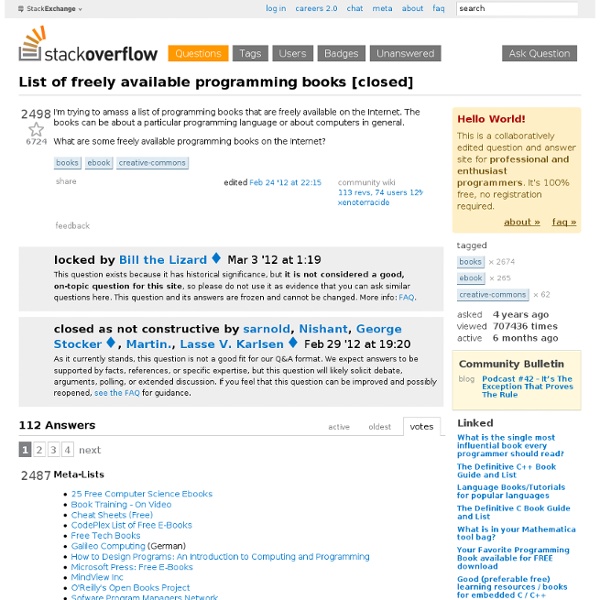



Free Programming Books Here is an uncategorized list of online programming books available for free download. The books cover all major programming languages: Ada, Assembly, Basic, C, C#, C++, CGI, JavaScript, Perl, Delphi, Pascal, Haskell, Java, Lisp, PHP, Prolog, Python, Ruby, as well as some other languages, game programming, and software engineering. The books are in various formats for online reading or downloading. This list will be updated daily.
Free Computer, Programming, Mathematics, Technical Books, Lecture Notes and Tutorials jQuery: The Write Less, Do More, JavaScript Library Google Open Source Blog TechCrunch Weblogicx | Logicx for Business Artistic Expression: Logo Design from Start to Finish Logo design in today’s world is totally underrated. People don’t understand how important a good logo is and how valuable it is to their business. Let me guide you through the basics of what makes a good logo, while also walking you through the process of creating the identity and logo design for one of my recent clients, Vero, a limited liability company based in Miami, Florida. Hopefully, this will give you an understanding of what actually goes on behind the scenes while creating a professionally designed logo. What is a logo? To understand what a logo is meant to do, we should first know just what a logo is: It’s one aspect of a company’s commercial brand or economic entity, and a logo’s shapes, colors, fonts, and images usually are different from others in a similar market. What makes a good logo? A good logo is distinctive, appropriate, practical, graphic, simple in form, and should convey one message. The design process Getting the job The brief Research and reference Original sketches
Design | Graphic Junkies Typography – Kerning There are a number of things to consider when you are working with type, one of the most often overlooked and misunderstood is kerning. Kerning is often confused with another form of letter spacing, called tracking. Tracking, however is not the same as Kerning. Continue reading → How Color Affects Mood And Perceptions For as long as man has been able to mix pigments to produce varying colors, we have been using it consciously or even subconsciously to affect our moods, perceptions and feelings, and as such in the hands of a professional we an really get a message across with its proper use. There are some broad categories of Color as outlined below (these are by no means the end-be-all, but its a good starting point). Cold Colors Colors like Blue, green and Blue-green are commonly associated with being cold, calm and trustworthiness. Icons and Iconic Representation Icons or pictorial images are nearly as common as the air we breath, they are around us, everywhere.